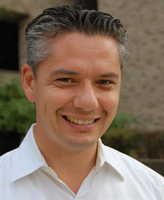
The study of constitutions dates back to Aristotle, yet remains as relevant today as it was then.
“It’s a perennial subject that I think is getting renewed attention, first with the fall of the Soviet Union and the constitution writing that went on with that, then the democratization movement in Latin America, and now the revolutions in the Arab world,” says Vincent Phillip Muñoz, Tocqueville Associate Professor of Religion and Public Life at the University of Notre Dame.
Long recognized for its strength in this area, Notre Dame’s Department of Political Science is expanding its investment in the subject as part of the recently established David Potenziani Program in Constitutional Studies, which is supported by a $2.5 million grant from the Potenziani Foundation.
The first Ph.D. students in a new graduate track in constitutional studies began their work in fall 2011, and an undergraduate minor will launch in fall 2012, continuing to build the program’s reputation as one of the best and most comprehensive in the subfield.
Interdisciplinary Approach
The new constitutional studies minor for undergraduates will leverage resources from across the University, including the Law School and its Center for Civil and Human Rights; the College of Arts and Letters’ departments of political science, history, philosophy, theology, and economics and its Cushwa Center for the Study of American Catholicism; and the University’s Kroc Institute for International Peace Studies.
“We want to draw from across the College and really across the University,” says Muñoz, who is coordinating the minor. “We hope members of the Law School in particular, but also others, might find what we’re doing of interest.”
Similar programs at many universities are limited to “pre-law” coursework focused largely on litigation, Muñoz says, but Notre Dame students will study everything from the origins and historical components of constitutions to comparative dimensions such as why some constitutions fail and others succeed.
The steering committee for the minor expects up to 200 students to enroll when the program is at full strength. Already, Muñoz says, the gateway course that all minors will be required to take—Constitutionalism, Law, and Politics—filled quickly when it was offered for the first time in fall 2011.
Expanded Offerings
New opportunities for undergraduate and graduate students aren’t the only academic initiatives in the works.
In May, Notre Dame will launch a peer-reviewed scholarly journal, American Political Thought: A Journal of Ideas, Institutions, and Culture. Published by University of Chicago Press, the journal’s inaugural editor is Michael Zuckert, the Nancy R. Dreux Professor of Political Science and one of the instrumental forces behind the new minor.
The department is also home to a robust speaker series, which featured a Constitution Day lecture by Notre Dame Professor Sotirious Barber this fall. Events planned for spring 2012 include the Potenziani Lecture on Constitutionalism and the Pursuit of Happiness by Akhil Amar of Yale Law School and a presentation by Princeton University’s Benjamin Kleinerman, the author of The Discretionary President: The Promise and Peril of Executive Power.
All these activities, Muñoz says, have their roots in the growing interest in constitutional studies.
“As the world goes through these democratic revolutions in the Middle East and around the world, people are asking: How do you implement the rule of law? How do you arrange power to ensure freedom and justice?
“That’s the work of constitutions; it’s a fundamental aspect of modern life.”
Learn More >
- Constitutional Studies graduate track
- Tocqueville Program for Inquiry Into Religion and American Public Life
- Vincent Philip Muñoz faculty page
- Michael Zuckert faculty page
- American Political Thought: A Journal of Ideas, Institutions, and Culture
- Related story: Political Scientist Vincent Phillip Muñoz Wins Book Award